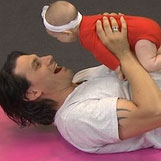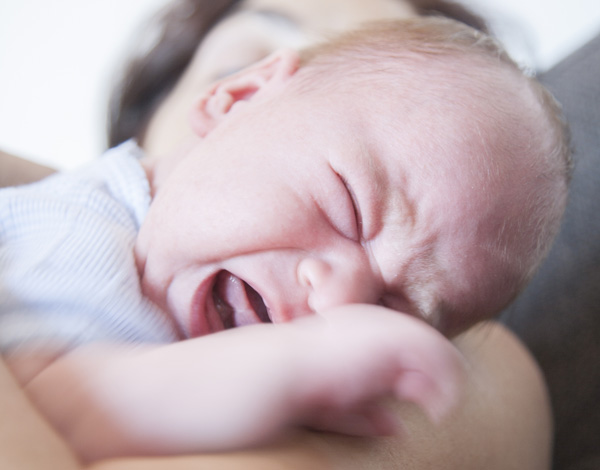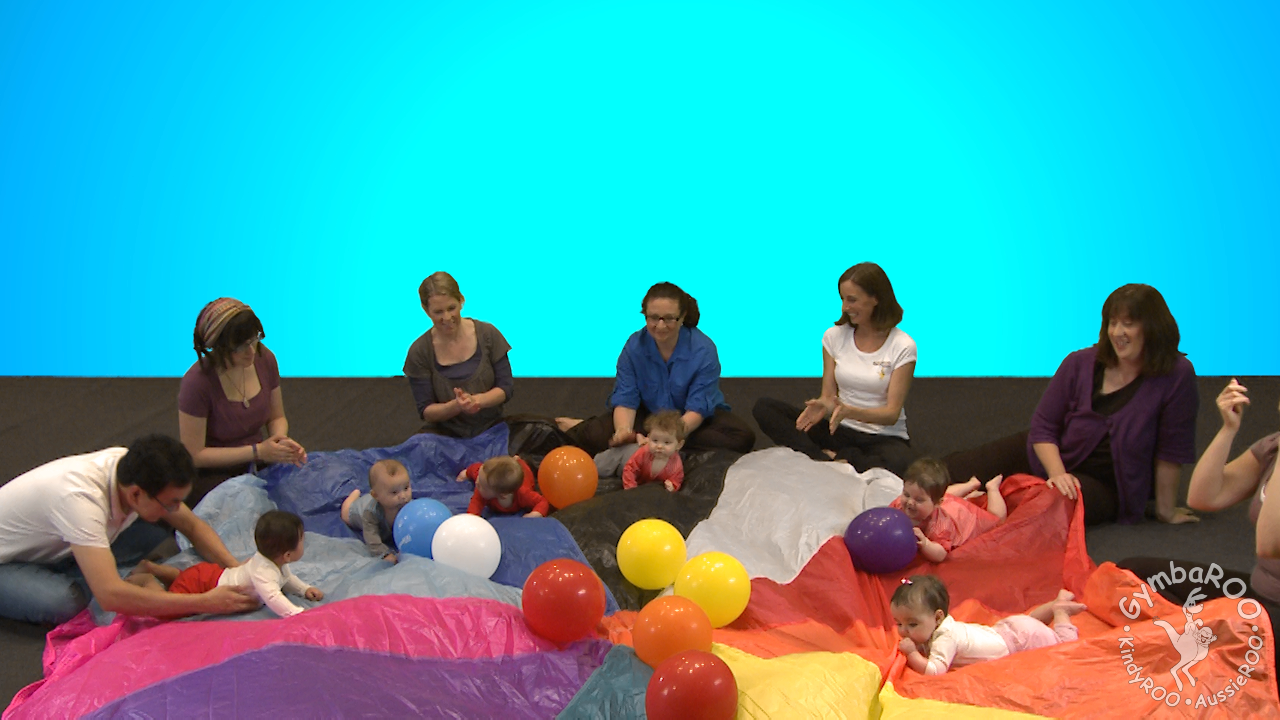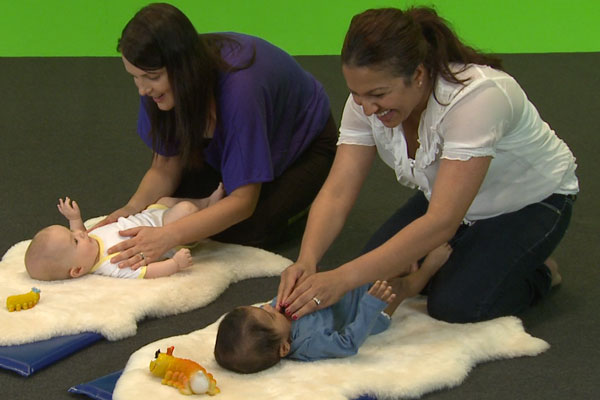Join the thousands of parents already raising smarter, happier babies with our online baby classes: The Active Babies Smart Kids series. Click here.
GymbaROO-KindyROO kids are excelling academically, emotionally, in leadership roles and on the sporting field. Find us at: GymbaROO-KindyROO
Dr Jane Williams and Bindy Cummings
Sensory overload is often referred to as overstimulation. It happens when a baby or young child is flooded by more experiences, sensations, noise and activity than the developing brain can cope with. While sensory stimulation is an important way babies learn about themselves and the world around them, in this article we talk about why some infants will easily become overstimulated and how you can prevent this from happening. You can also watch our online video series of baby classes for babies from birth. This video series helps parents understand what is the right stimulation to give their babies and when is the right time. Our series comes highly recommended by paediatricians, early childhood experts and the Maternal Child and Family Health Nurses Association.
While a baby’s brain does develop very rapidly from birth, life outside the protected environment of the womb is much louder, brighter, more active and less predictable. During the first months, a newborn’s brain is learning how to sort, analyse and respond to all this new information, and initially it does so, one sense at a time. If a baby is overstimulated the brain will quickly become overloaded. Sensory overload may result in agitated crying and unsettled behaviour. Your baby may turn his head away from you, his movements might become jerky, and he may clench his fists, wave his arms or kick. Some babies respond by completely shutting down and going to sleep because they are so tired and overwhelmed.
Newborns also have a very strong survival reflex response. The Moro reflex causes them to cry if they are overstimulated by loud noises, bright lights, sudden movements or too much stimulation. The Moro response also causes the body to produce the ‘flight or fright’ hormone, cortisol, raising blood pressure and causing babies’ skin to go red and to sweat. Babies who are overstimulated for long periods have continuously high levels of these stress hormones flowing through their brains and research tells us that they are at risk of ongoing emotional and developmental difficulties. So, while some stimulation is important for development, it is best done in short bursts with rest periods in-between. If your baby is exposed to overstimulation, it’s very important to provide her with a calm environment so stress hormones can return to their normal levels. When you come along to GymbaROO-KindyROO, you will notice that stimulating activities are punctuated with periods of calm. So, massage (a calming activity) is followed by exercise (a rousing activity), which is followed by a nursery rhyme (a calming activity). This way babies have time to relax and the brain has time to compute the sensory inputs without becoming distressed.
Importantly, we also understand that the brain responds to SLOW movement much more efficiently and easily than fast movement. Slow movements give the developing brain time to work out what’s happening and how to respond appropriately. Fast movements often confuse the sensory systems, and rather than stimulate the wiring and the firing of the brain, it just stops responding until it can make sense of what’s happening again.
GymbaROO-KindyROO’s 10 principles of infant stimulation
- In the first six weeks of life, what your baby needs most is to know she is loved, fed and safe. This creates the foundation for secure emotional attachment, which is essential for healthy brain development.
- Gradually introduce your baby to different forms of stimulation. Too much, for too long can cause your little one to become irritated, agitated and upset. Your baby’s attentiveness is vital to what may be going on physically and emotionally. When he is not over stimulated, tired, hungry, or otherwise distracted, he will be most attentive. Access our video series on how to provide the right type of stimulation from birth here.
- Your baby is sensitive to your moods. Communicate your love and warmth as you hold him closely. Your baby develops a sense of security as he feels your warmth, your soothing touch and smells your scent.
 Interaction is extremely important. Your baby will learn best when fully interacting with the most important people in her life. A screen, (TV, Tablet, phone, etc) is not a good companion for a baby and is not recommended. These devices do not provide one-to-one interactions or responses and research is proving them to be detrimental to healthy development. Read more here.
Interaction is extremely important. Your baby will learn best when fully interacting with the most important people in her life. A screen, (TV, Tablet, phone, etc) is not a good companion for a baby and is not recommended. These devices do not provide one-to-one interactions or responses and research is proving them to be detrimental to healthy development. Read more here.
- Your baby’s position makes a difference whether in the cot, on a play-mat, on the floor, or in your arms. The cot should be repositioned monthly until about nine months of age. In addition, your baby’s head position should be alternated from one end of the cot to the other, giving him varying orientations thus providing a variety of stimulation. Flickering patterns of light on the wall change in appearance when viewed from different angles.
- Emphasise repetition. Repetition is a primary means by which babies learn. Rituals such as tucking in your baby with a lullaby or reading to her nightly, promote learning. Once your baby has mastered a given stimulus, it has been learned and may become boring. It is time to advance to another stimulus.
- Use infant stimulation to arouse and quieten. Be sensitive to your baby’s physical, emotional and mental states. For example, when your baby is alert, this is not a time to rock him gently to sleep; this is a time to stimulate. Conversely, when your baby is tired or overstimulated, this is not the time to insist that he pay attention; this is a time to hold him and rock while humming.
- The more appropriate stimulation babies receive, the more they tend to want it and seek it on their own. Stimulation in infancy lays the foundation for a curious adult, but be careful in the first months not to stimulate too many senses at once, nor for too long.
- The environment you provide at home has the strongest impact on your baby’s brain. Babies possess a biologically driven need to learn during their first year. Your child’s environment includes her cot, room, objects, sounds, tastes, smells and most importantly, her mother, father, siblings, extended family and friends.
- Practice rhythm, reciprocity and reinforcement. Rhythm relates to the progression of reactions your baby goes through when paying attention to a stimulus. A cycle occurs as your baby becomes excited, then calms down and becomes excited again with the next stimulus. Reciprocity refers to your sensitivity to your baby as he moves through stimulating experiences. Watch your baby’s reactions attentively so you learn to recognise his pattern of response and adjust the stimulation accordingly. Reinforcement denotes your positive reactions to your baby. Providing positive reinforcement to your baby after he reacts to a stimulus encourages him to repeat that behaviour.
While sensory stimulation is an important way for a baby’s body and brain to learn about itself and the environment, a baby can very quickly become overloaded when too many sensory messages overwhelm the brain’s ability to understand and respond. Slow, intermittently stimulating activities that are practiced at home on a daily basis are best for your baby’s brain in the first months of life. Our GymbaROO-KindyROO classes are all about helping parents to learn what is the right stimulation to give their babies, at the right time. You can watch, learn and join in with the right kind of activities and games from birth with our Active Babies Smart Kids online series and you can join our highly recommended GymbaROO-KIndyROO classes once your baby is six weeks of age.
Dr Jane Williams (PhD, BMgt, RN(Paeds)) is the Research and Education General Manager for GymbaROO and KindyROO. Dr Williams is one of Australia’s leading experts on baby and child development. More on Dr Williams here.
Bindy Cummings (B.Ed(Human Movement) Hons) has worked as a teacher, child development consultant, early childhood development lecturer, teacher trainer and INPP & iLS consultant. She is the co-creator of GymbaROO’s Active Babies Smart Kids online series, has authored many published articles on child development. She is working on the content and development GymbaROO’s portal and online training programs, and the creation of new online programs for parents and children. More on Bindy Cummings here.
Active Babies Smart Kids – Online Baby Classes
GymbaROO-KindyROO’s online series of baby classes is taking the parenting world by storm! It is highly recommended by doctors, paediatricians, early childhood experts and the Maternal Child and Family Health Nurses Association. This series is being called: “The essential guide for parents”. Join the thousands of parents already playing with their babies from birth, in the best way for brain and body development and laying crucial foundations for future learning. What happens in the first year, not only matters, it matters a lot! Introductory video below.
Click here: Active Babies Smart Kids online series of baby classes
Try the first episode FREE: Tummy time + baby fun and development class 1
GymbaROO-KindyROO
Thousands of parents, babies and children are presently involved in our programs and creating rising stars. GymbaROO-KindyROO kids are excelling academically, emotionally, in leadership roles and on the sporting field. Come join all the fun and learning! “GymbaROO – The best decision I ever made for my child.” Classes from 6 weeks old – 7 years GymbaROO KindyROO
Enjoy the following GymbaROO-KindyROO articles
GymbaROO-KindyROO: Who, what, where, why and how
All about GymbaROO-KindyROO’s online baby classes for parents and babies: Active Babies Smart Kids
How to raise a smarter, happier baby
Why active babies make smart kids
Become a GymbaROO-KindyROO franchisee
10 ways to give your baby a great start.
Tummy time for baby’s healthy development.
An important warning for all parents of babies.
Baby milestones: A journey, not a race.
‘Baby Seat’ devices and propping your baby to sit. Please avoid.
Click here for more GymbaROO-KindyROO article choices






